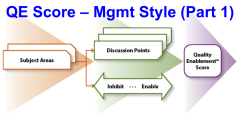… Can be Measured (Management Style Dimension) – Part 1 of 2

“The best executive is the one who has sense enough to pick good men to do what he wants done, and self-restraint to keep from meddling with them while they do it.”
Theodore Roosevelt
This week, we’ll start our discussion of the Subject Areas and Discussion Points in the Management Style Dimension. As we did with both People and Agility, we’ll split this discussion across two weeks, to keep the entries reasonably consistent size-wise. For a review of the Management Style Dimension, click here.)
As we’ve done previously, I’ve included the weight (e.g. [3]) and guidelines for scores of 1, 4, and 7. Those that are purely inhibiting are tagged with “(inhibiting)” and only have guidelines for 1 & 4; likewise, those that are purely enabling are tagged with “(enabling)” and only have guidelines for 4 & 7.
QE Score Assessment – Management Style Dimension – Part 1 of 2
Empowerment (Support / Trust)

- How much do you feel that your manager trusts you to do your job? [4]
1 – Not at all
4 – So-so … I’m not sure
7 – Totally trusts me
- How much do you feel that you are micro-managed? (inhibiting) [3]
1 – Absolutely
4 – No, I’m not micro-managed
- Once your manager empowers you to do something, do you get the support you need to be successful? (enabling) [3]
4 – Not really
7 – I get all the support I need to be successful
- How flexible are the rules and guidelines that govern daily activities? [2]
1 – Not at all flexible
4 – We can make some changes with manager approval
7 – We’re allowed quite a bit of latitude within broad guidelines
- How empowered are teams to make their own decisions? [3]
1 – Not at all
4 – Teams can make suggestions to management for approval
7 – Teams are highly empowered to make decisions
Collaboration (Change / Flexibility)

- How are decisions affecting individuals and/or teams made? [3]
1 – By management without team input
4 – There is team input, but decisions are made by management
7 – Teams are always involved in decisions that affect them
- How receptive are management to worker ideas? [3]
1 – Not at all
4 – They’ll listen if we approach them with an idea
7 – They actively solicit ideas from us
- What level of involvement do workers have in decisions that affect them? [2]
1 – None
4 – We get a heads-up that changes are coming, so we can prepare for them
7 – Prior to implementing decisions, we get the chance to guide changes to make them more effective
Innovation (Risk-taking / Error tolerance)

- What do managers do to foster innovation? (enabling) [4]
4 – Nothing
7 – We have active programs to foster innovative thinking and provide support for new ideas
- Do employees feel they can take reasonable risks to try something new? [4]
1 – No
4 – We can take reasonable risks, but might get blamed if things don’t go well
7 – Yes – we management support, with an understanding that we will prosper with success and learn from failures
- What happens when mistakes are made? [4]
1 – Responsible parties get blamed
4 – It depends on the individual manager
7 – The organization treats these as learning opportunities
- Do workers fear that they will be punished for mistakes? (inhibiting) [4]
1 – Absolutely
4 – No – it’s recognized that mistakes happen
Communication / Empathy

- Do you believe communications from management are clearly understood? [3]
1 – No, they are not clearly understood
4 – Some are, some are not
7 – Yes, I believe all communications from management are clear and well understood – they ask questions to confirm the messages were received
- Do you believe managers understand you when you’re communicating with them? [3]
1 – No, they don’t seem to understand, and don’t seem to want to understand
4 – Some do, some don’t. I don’t really know which for any conversation.
7 – Absolutely – managers ask key questions to ensure we are communicating effectively
- Do managers communicate a consistent set of information? [3]
1 – No, we get inconsistent messages, even from the same manager
4 – Some things are consistently communicated, while other communications seem to contradict.
7 – Yes, we get consistent, reinforcing messages from each manager. They seem to all be on the same page.
- Do you believe your manager cares about you beyond your work life? [4]
1 – Not at all
4 – My manager cares, but at a superficial level
7 – Absolutely – I believe my manager cares about me and my family at a personal level
- Do you feel that managers communicate all that you need to know to effectively do your job? [3]
1 – No – there are often gaps in what I need to know in order to be effective
4 – I get some of what I need from my manager, but have to discover a fair amount on my own
7 – Yes – my manager asks probing questions to make sure that I have all the information needed for success
- How much 1:1 contact do workers have with their direct manager? [3]
1 – None
4 – 1-2 times per week
7 – At least daily
- How much 1:1 contact do workers have with their 2nd-level manager? [2]
1 – None
4 – Once a week
7 – Several times each week
What’s Next
Next week, we’ll complete the Management Style QE Score discussion, and therefore complete the QE Score assessment discussion for all Dimensions.
Until Then …
“A true leader has the confidence to stand alone, the courage to make tough decisions, and the compassion to listen to the needs of others. He does not set out to be a leader, but becomes one by the equality of his actions and the integrity of his intent.”
Douglas MacArthur

What are your thoughts? Please share your comments in the block below.